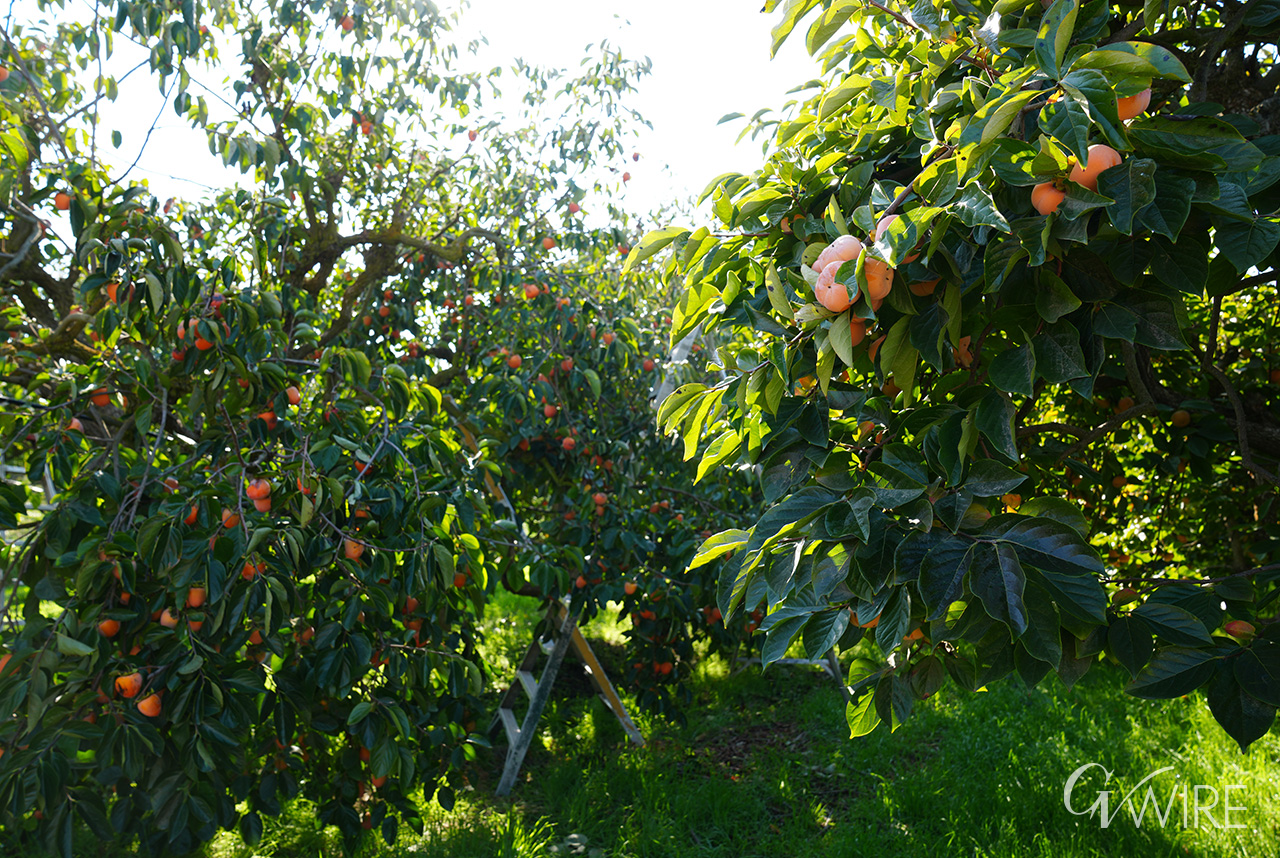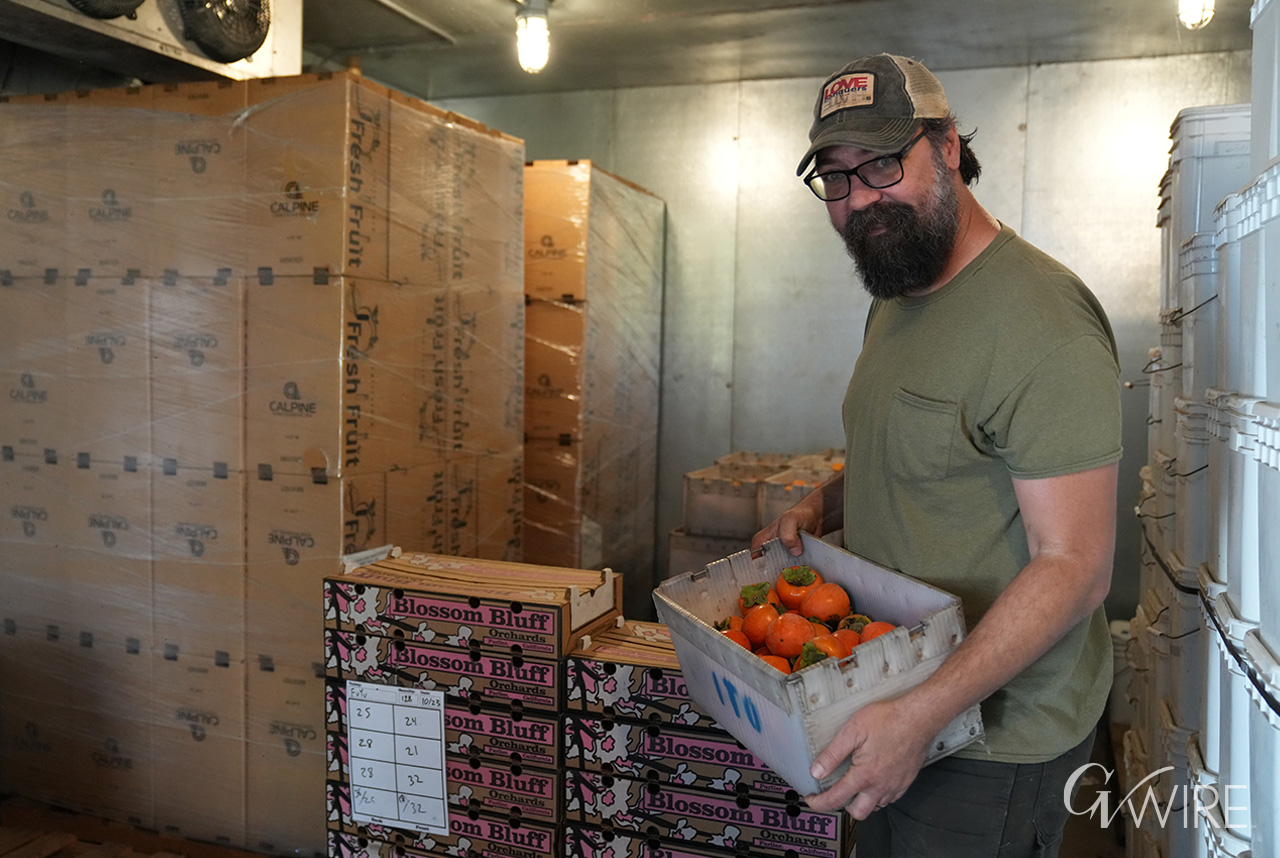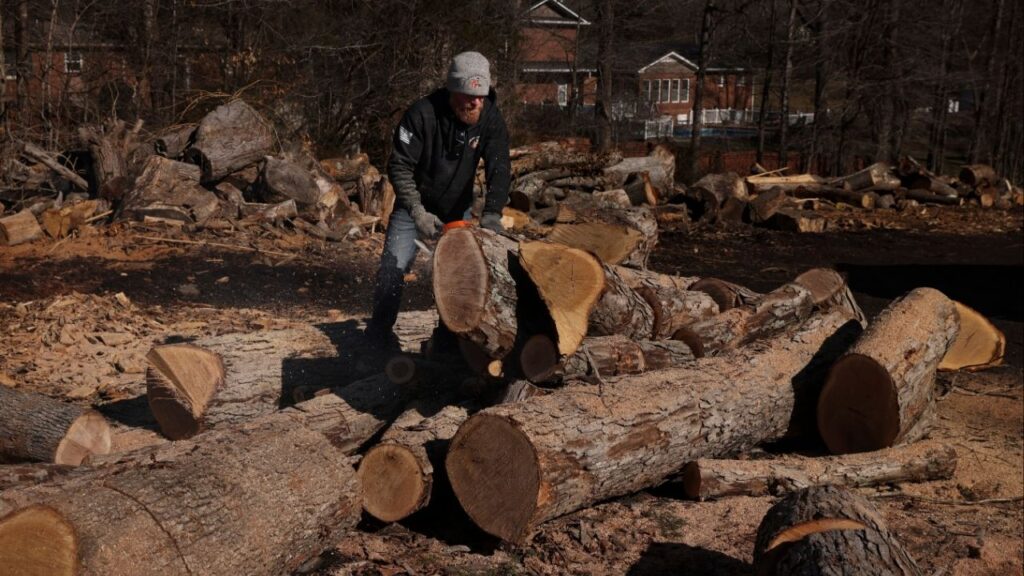Reedley farmer Bryce Loewen of Blossom Bluff Orchards holds a box of organic persimmons ready to ship on Friday, Oct. 31, 2025. (GV Wire/Edward Smith)

- Reedley farmer Bryce Loewen allows weeds to grow at Blossom Bluff Orchards, helping promote healthy soils.
- The organic farm finished its transition to micro-irrigation, allowing minimal tilling.
- Organic sales have leveled off from highs in previous years, but many farmers adopt adaptive ag practices.
Share
|
Getting your Trinity Audio player ready...
|
The knee-high grasses growing between the rows at Blossom Bluff Orchards in Reedley might be reminiscent of a bad neighbor letting their yard become an eyesore.
But the grasses and vegetation are all part of farmer Bryce Loewen’s approach to organic farming. He says letting nature take its course has led to healthier soils and sweeter fruit for the dozens of crops he grows.
“If you go around the farm now, you’ll see it’s very green and weeds and all kinds of natural vegetation is just abundant to the point where we have to control it by mowing or weed whacking or something, trying to keep it workable for our people that need to be out there,” Loewen said.
Low-Till Helps Create a Soil Biome: Loewen
Tucked into a corner of a bend in the Kings River, about 150 different varietals on 78 acres grow on the farm. They range from tree fruits, persimmons, and pomegranates to kiwis and a dozen types of citrus.
The farm does its own marketing, selling and delivering directly to grocery stores and selling at farmers markets across California. They also dry and package all sorts of different fruits under the Blossom Bluff brand.
Loewen’s family got their organic certification in 2006, but his father started them on the path in the early ’90s. He says that because they lived on the farm, the family wanted to reduce exposure to pesticides and herbicides.
Organic farming has other benefits, as well.
When he does tours, he’ll grab a shovel and dig up the earth and compare it to that of the farm next door. He’ll point out the differences in color and the earthworms wriggling in the untreated soil.
“The less you upset the soil, the more opportunity that soil has to create a biome that’s diverse with microbes and with critters and different types of life,” Loewen said.
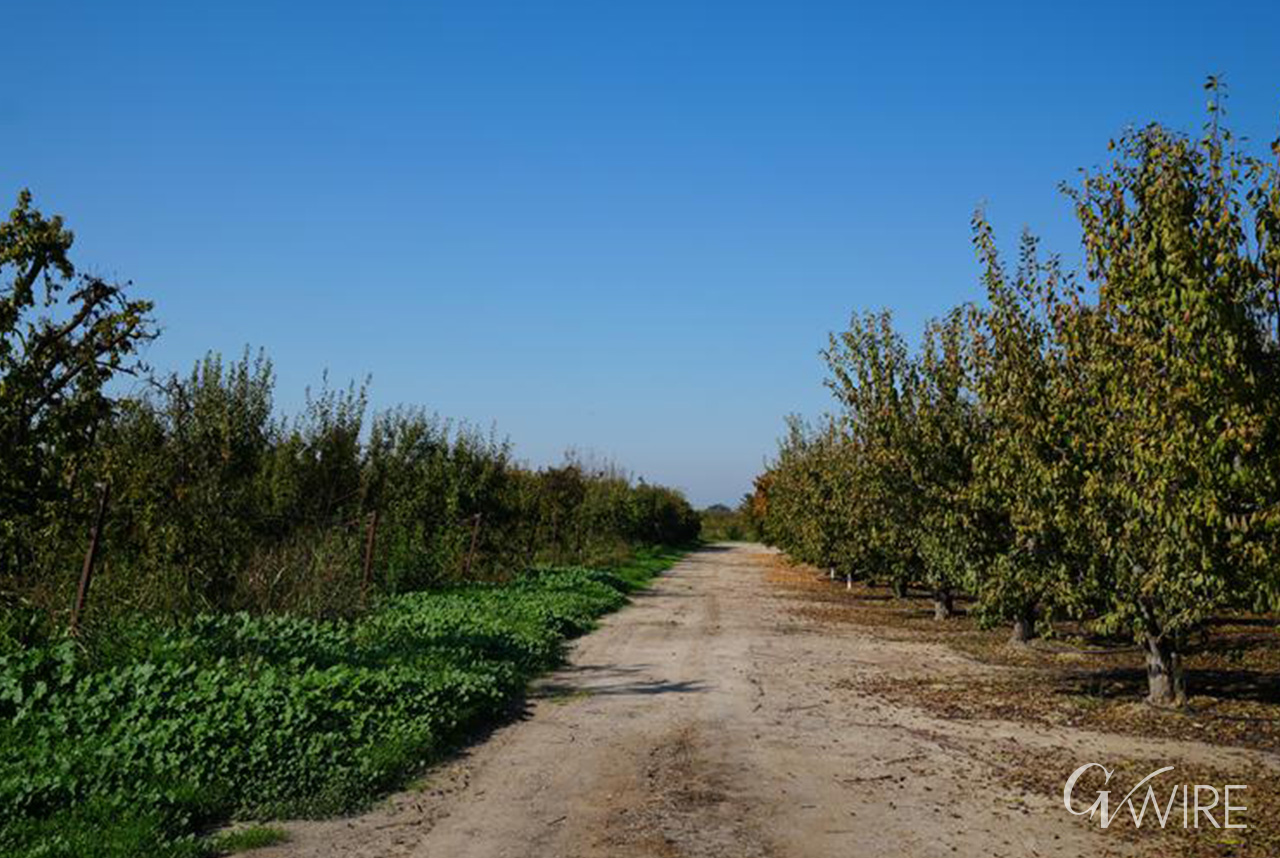
Reduction in Troublesome Weeds
Restorative soil practices can mean a lot of different things in agriculture. Having mostly tree fruit, it wasn’t hard to limit the tilling of the soil, but Loewen took it a step further when they finished their transition to micro-sprinkler irrigation five years ago from the flood irrigation they were previously using.
Disking the soil for weeds and trenching channels for irrigation overworked the soil, Loewen said. With less disturbance, he’s now noticed the cover crops he planted years ago returning season after season.
What’s more, the lower vegetation is outcompeting the more troublesome weeds such as Johnson grass that grows tall and spreads wide. Some might expect overgrowth in the rows drinks up water faster, but that’s not been the case, Loewen said. Grasses help sequester water from the air and help decrease evaporation in the hotter months, he said.
He wants to bring on sheep to graze the land.
“Since we’ve ceased the channel cutting, those really problem areas have shrunk,” Loewen said. “I’m hoping that that continues to be the case and that eventually we might eradicate it, but that’s probably years out still.”
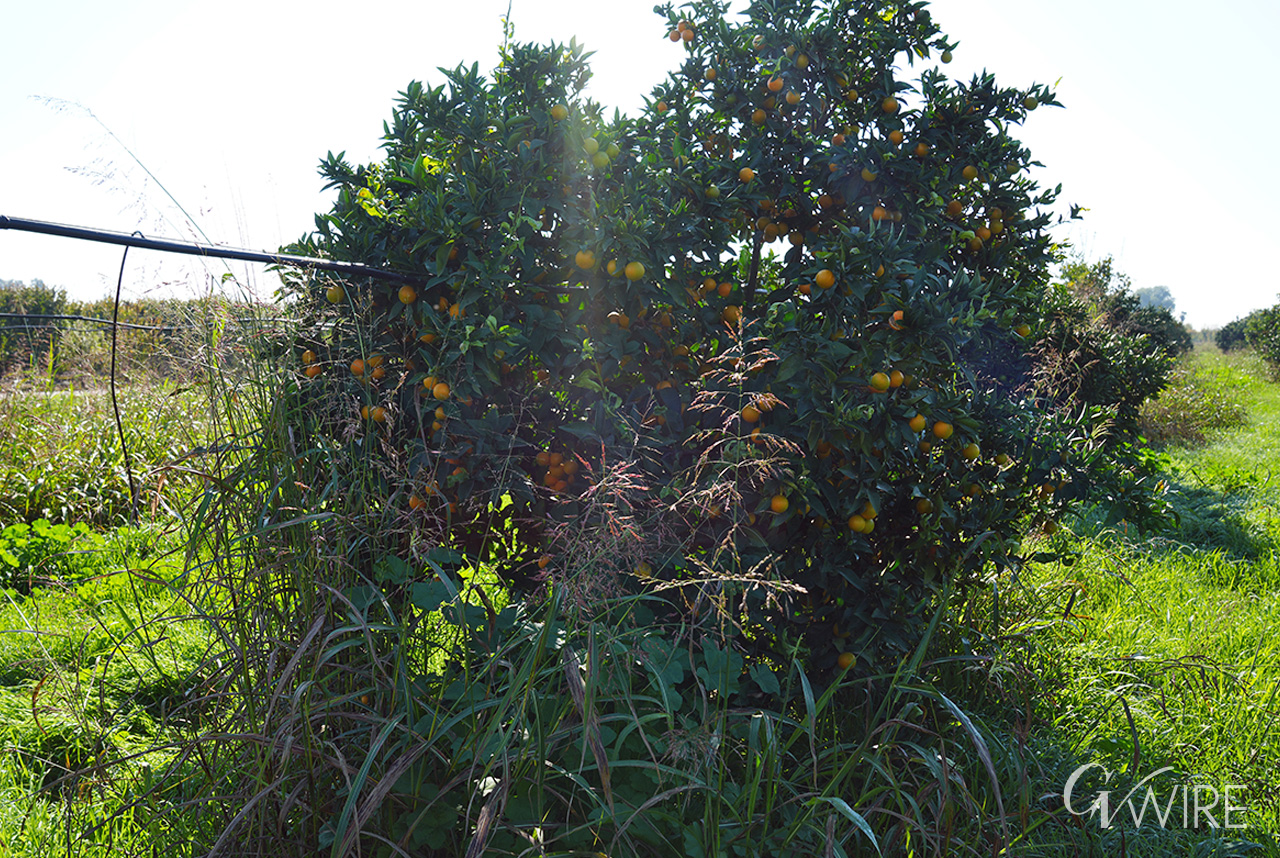
Organic Premiums Have Shrunk.
California organic produce sales peaked in 2021 at nearly $5.2 billion but have since declined to about $4.6 billion in 2023, according to the California Department of Agriculture’s most recent report.
Fresno County’s organic farm sales shot up in 2021 to $809 million from $247 million the year before. It came back down to earth the next year at $290 million, climbing yet again to $412 million.
In the years since its highs, organic price premiums have shrunk, making it less attractive to many farmers considering the higher cost and lower production volumes typical to organic farming, said Ryan Jacobsen, CEO of the Fresno County Farm Bureau.
“Higher production costs with lower production — historically, that difference in premium would make up that difference,” Jacobsen said. “But we’ve seen a shrinking for many commodities over time.”
Organic farming takes a different level of commitment, said Loewen. Whereas organic growers can easily find a market in California, the label can carry a negative stigma in other parts of the country, Loewen said.
The association with the “coastal elite” can be so negative that some growers committed to organic practices won’t advertise the label, he said.
Ensuring Healthy Soil
Many Fresno County farmers have adopted these adaptive practices with or without the organic label, Jacobsen said.
“Low-till or minimal till has been widely adopted across many different types of commodities there and it’s driven for a multitude of purposes,” Jacobsen said. “Obviously, the reduction of the number of passes to — hopefully — a decrease in production cost in that particular area. But in addition to that, we want to to continue to make sure our soils remain healthy.”
Loewen’s next-door neighbor has begun to let weeds grow between their orchard.
“There’s a lot of reasons that farmers choose to grow the way they do,” Loewen said. “That suggests to me that maybe there is still potential for progress in other areas.”
